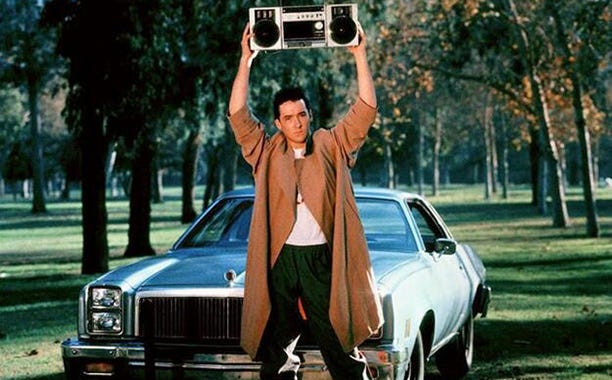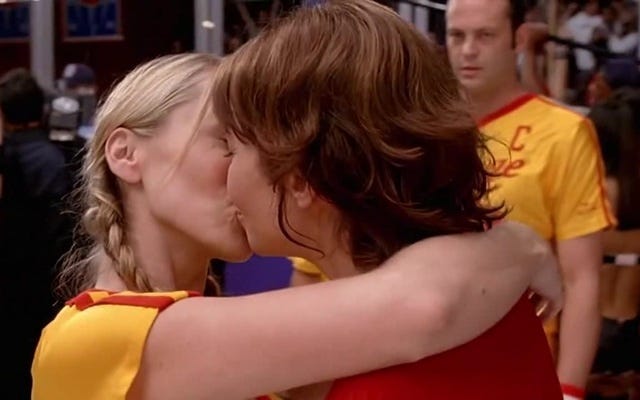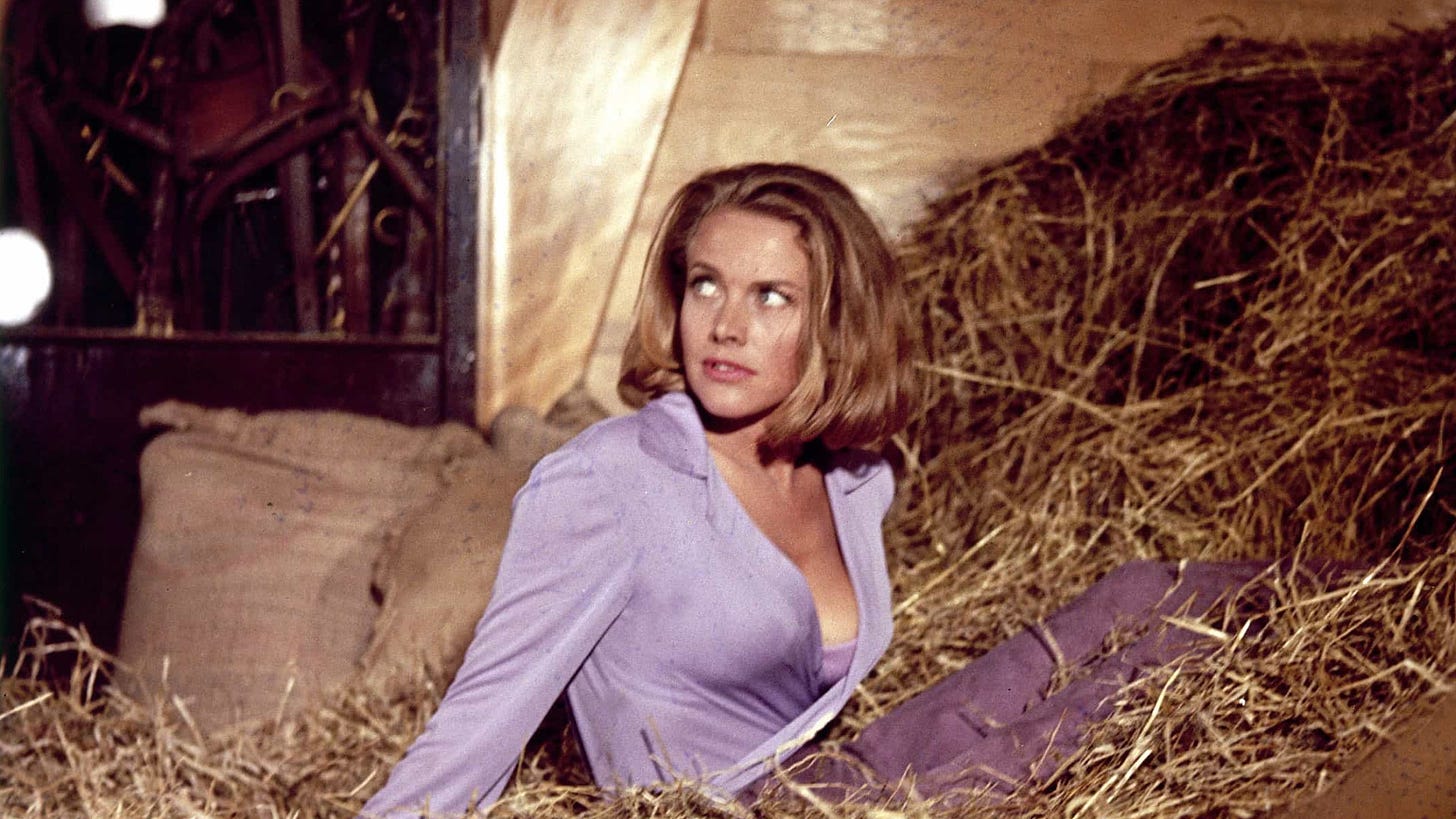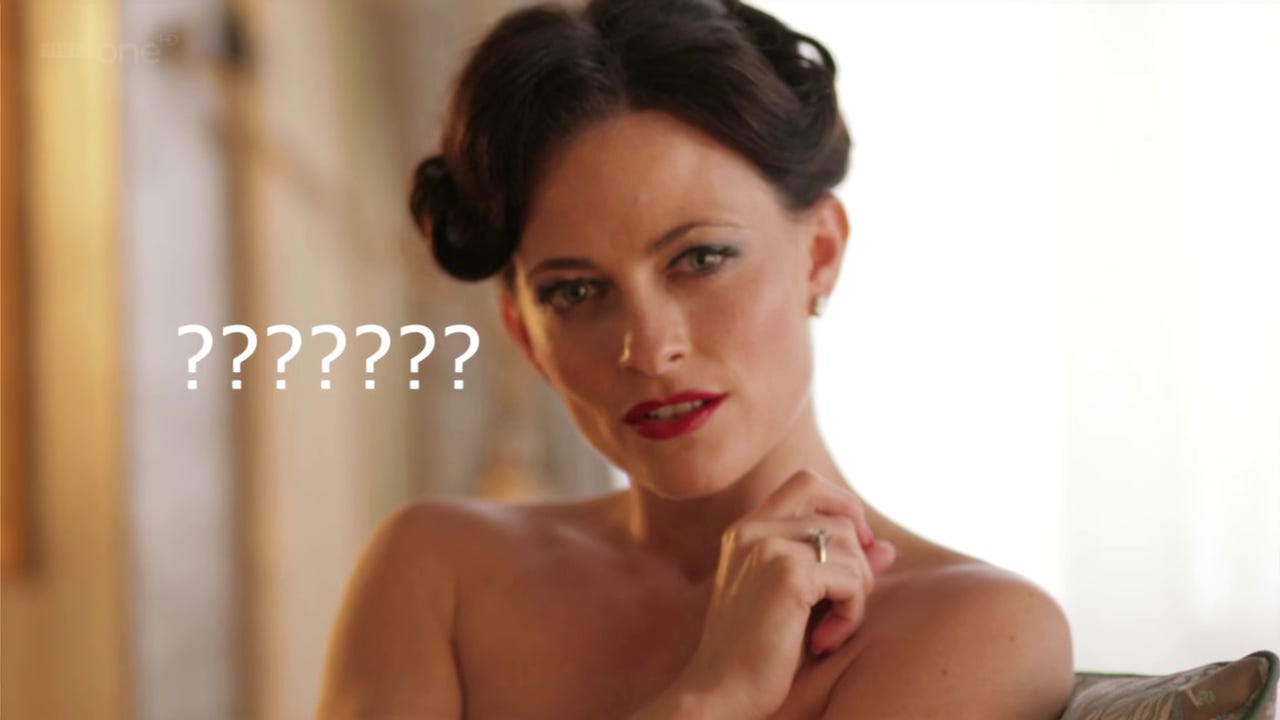Problematic Badass Female Tropes #7:
I’m Only Here For My Vagina
Bond slowly comes to. He has been propped up in a large leather chair which cushions his aching body as well as lolling head. Blearily, he blinks, attempting to clear his vision (and aforementioned head). Leaning over him blurrily is a woman, to judge by her excellent shape. Bond blinks again, and widens his eyes. Coming into focus, the woman smirks at Bond. He sees she is blonde, beautiful, and wearing a gold vest which shows off her assets to excellent effect.
“Who are you?” Bond asks the vision in gold.
“My name is Pussy Galore,” she announces in reply.
“…I must be dreaming…” Bond murmurs, beginning to smile. Then he feels the stinging soreness of his ribs on the right side. “I thought I’d wake up dead,” he comments, attempting to muster his normally foolproof charm.
The still smirking beauty straightens, explaining the tranquilizer dart and where they are (a luxury personal jet, apparently), and Bond can’t take his eyes off the tightly cinched, tiny waist and perfect proportions of Pussy Galore’s (can that really be her name?) healthy curves. Even when the specimen of a servant girl shuffles up, bowing in subservience, gold and white skirt and scarves wrapped tightly around her slim figure, showing an astonishing midriff, Bond still can’t banish his wandering eyes or imaginative mind away from Pussy Galore, who snaps that she’s not just a pretty face but a “damn good pilot,” too, and proceeds to ignore Bond as he continues to attempt to charm her.
Later (in the film version of Goldfinger) we are subjected to a scene in which these two characters: Bond, badass male charmer and superspy, and Galore, badass female martial artist and highly skilled pilot, spar with words and judo until Bond ends up pinning her to the ground on her back (a position she, mysteriously, has no judo to escape from). This is exactly where he wants her, and he plants a kiss on her lips, ignoring her (suddenly feeble) attempts to push him off. He just keeps kissing her, till her pushing, protesting arms change into an embrace, and she reciprocates.
Ah, the Forced Kiss (also known as Kiss Her Till She Likes It). Not peculiar to James Bond, but it is a common cliché found amidst the plethora of misogynist tropes that I could write a whole separate series of articles about. Suffice to say, Ms. Galore’s character name says it all. She’s a vivid example and epitome of our seventh and last Problematic Badass Female Trope:
I’m Only Here For My Vagina
The definition of this trope is pretty simple: sex is the only purpose for this breed of badass female character. Sex appeal (and sometimes the act of sex itself) is this character’s superpower. However skilled, strong, and badass the character is, none of her accomplishments, brains, or brawn mean anything next to the power of her pussy. Thinking of Ms. Galore in particular: she’s a damn good pilot, so much so that a megalomaniac like Auric Goldfinger uses her for his personal pilot; she’s a badass martial artist—despite Bond’s condescending quip, “Who taught you judo?” she holds her own in their sparring match in the barn. That is, up until it becomes a roll in the hay. Then this erstwhile strong character, leader of a fleet of female pilots, third in command to only Oddjob in Goldfinger’s evil retinue (and it doesn’t actually seem like she’s much lower in that supervillain’s hierarchy), suddenly, Marion Effect-like, becomes a mewling subservient to Bond.
The bait and switch in this insidious problematic badass female trope is just that—despite the female badass being strong and capable, sex is her only important (or memorable) characteristic or skill, and once the male hero has accomplished his sexual dominance over her, she goes away. This is her only function and her only purpose, no matter what else might be badass about her.
The underlying, central problem of hyper-sexualizing (especially strong) women is a thread that runs through all seven of the Problematic Badass Female Tropes in various ways, of course, but here it’s the core of this one’s problematic aspects. In I’m Only Here For My Vagina, not only is the female badass made subservient, but she’s actually transformed into a function of the male’s sexual power. The female character is reduced in inverse proportion to the elevation of the male hero’s sexual prowess. The stronger the female sex object, the worse the flip is. She’s only there to make the male character more badass by conquest of her. The stronger she is, in other words, the stronger he is for subduing her. There’s a reason Bond doesn’t think to jump in the sack with the beautiful, simpering servant on that plane, but is fixed on Pussy Galore instead. The waitress’d be too easy. The savvy, snarky pilot, however, is a challenge. Because she’s a badass. Similar to the Vicomte De Valmont in Dangerous Liaisons, the easy lay is below Bond. The real challenge, the sexual conquest that really makes him a man, is the strong, kickass woman who at first appears his equal (and must therefore quickly be put in her place—as a sexual object, first and foremost).
Another facet of this trope is the embodiment of the hyper-sexualization of female characters in general. Often the IOHFMV character is a force of sexuality: she’s smoking hot, takes sexual conquests herself, and is so amazingly sexy/good in bed that sex is (sometimes literally) her superpower. Only our male hero is immune to her charms. Why? Because that’s what she’s there for—her vagina, that which bewitches, cows, and conquers all other men (or turns them into pigs, amirite?). And only one man, our hero, can overcome such power.
And overcome he does. In fact, quite often, the female badass who exudes such strong, autonomous feminine sexuality is the villain. Evil Bond Girl Onatopp, original sexy witch Circe, Poison Ivy, Catwoman (who bounces between being antagonist and wife to hero Batman), Grendel’s mother (played by Angelina Jolie) in Beowulf… The more powerful the sex factor in these female badasses, the bigger notch in the male hero’s belt. Because they will always fall to him, whether they are defeated in death by the hero’s hand, or lose all their power by becoming his lover; either way, they are rendered weak and subservient to him. That’s what makes the male hero special: he’s the only one that can dominate her.
Which brings me to our particularly pertinent sub-trope:
Oops I’m Not Gay After All
In the original Ian Fleming novel Goldfinger, it is made explicit that Pussy Galore is a lesbian. In fact, it’s stated in no uncertain terms that she and all her female pilot fleet are all lesbians. She still ends up as Bond’s lover, however, and there’s a telling and tragic monologue at the end of the book in which she describes a traumatic childhood wherein she was sexually abused by her uncle. Galore describes choosing lesbianism as a reaction to being abused by men in power in her life, and as a way of taking power for herself on her own terms by doing so. Too bad she tosses all that independent power away, thanking Bond for being the right man to come along and ‘turn’ her, and to make her into a trusting child. “I never met a man before,” she tells Bond (at the end of the book). Which is what every woman secretly wants, right? Everyone sing along with me: “Someday my prince will come…”
In the movie adaptation, however, there’s no mention of her sexual orientation other than she claims to not be sleeping with her boss Goldfinger. She’s merely one of his star hench(wo)men, so we are free to watch this badass female character get broken down by the sheer force of Bond’s sexual prowess without question. Because, as anyone who has ever viewed a rom-com will tell you: if the female refuses the male hero, he just needs to pursue her harder. He who pursueth hardest gets the girl, no matter what. And he who conquereth all females, he is the baddest-ass dude of them all.

Lesbians have no place in this paradigm, because they don’t have any use for men. If she’s gay, the male hero can’t have sexual relations with her, therefore she can’t be dominated by him, therefore this terrifying gayness must not be true. She must simply be waiting for the right man to come along and change her mind. And, as we all know, the male hero is always the right man.
But Jenn, you may be protesting, that’s an old Bond film, from a different time, based on a book which is even older. We’ve come a long way, baby! Surely contemporary society doesn’t allow this horrifically obvious misogyny to perpetuate?
Okay, want something from a more recent and enlightened time period? How about BBC Sherlock’s Irene Adler? She follows this misogynist sub-trope to a T: she’s the ultimate in strong sexuality, a lesbian and not only that, but a dominatrix. Surely no man could possibly take her down/dominate her? She’s got the royal family (and the arguably more powerful Mycroft) dangling from the little finger on her whip hand. But, as Watson notices, her interactions with Sherlock are unusual to the point of being unique (“Does that make me special?” she asks. “Maybe,” Watson replies with a nod), and she makes the enormous blunder of (SPOILERS) declaring her crush on Sherlock as the key code to her phone, which leads to her ultimate defeat. Even the end of her story isn’t under her control, as she’s rendered into a damsel in distress that only Sherlock can save, which of course he does. Her character’s power came from her sex work and her alliance with Moriarty, a man. Her powerful sexuality helped her dominate pretty much the whole world. Until Sherlock came along to dominate the dominatrix. The right man, who is the only one powerful enough to conquer her.
And that’s what this sub-trope is about: the nullification of female sexual autonomy. Sexual liberation, female domination, and any sexuality that excludes men are simply not permissible. She must be tamed; a sexual prize to be won. Even lesbianism is merely a hurdle to be overleapt. The female badass character’s gayness either isn’t real, or it magically goes away in favor of the male hero. Or you get the equally insidious version of this sub-trope: I’m Bi But You’re The Best Thing In The World And Yes Of Course You Get To Watch Me Kiss A Girl Because That’s The Ultimate Reward For Your Persistence (see Dodgeball among other comedies for this sexist tradition).

I’m Only Here For My Vagina and its sub-trope Oops I’m Not Gay After All negate anything otherwise interesting about the female badass because it reduces her to only sex. Worse, it reduces her into a symbol of the male hero’s strength, as any badassness of her own is subsumed into glory for the male hero’s prowess and power.
Obviously, here in the wake of #metoo and the disgusting manifestos of the incel movement, we can see clearly what this seventh trope does to both men and women in real society. If she says no, that means the man isn’t playing the game right, pursuing her hard enough or often enough. Nice girls are taught to be coy, even if they’re interested in sex. Only bad girls say they want it. Good girls want it but they won’t admit it. So go get her. No rarely means no to the male hero.
These awful norms are exactly what these tropes hammer into our socially developing brains and it’s damned hard to shake. Especially when we’re faced with female characters who are badass and strong, at least on the surface. What we can do is to be aware, to call out all these tropes when they pop up, and discuss and celebrate those few, those happy few, examples of female badasses done well.
This is the last of the Problematic Badass Female Tropes, readers: thank you so much for engaging with me on these discussions. I got valuable feedback in my own blog’s comments and my social medias back when these were originally published pre-pandemic, and was hearing from writers and filmmakers (and others) that they use these seven articles often, to help their work be better. I am glad for my Substack following now, who can enjoy the refurbished versions of these analyses—I’d love to hear your thoughts about any of this stuff, anytime, in Notes or in the comments.
Stay tuned next week, though—the PBFTs aren’t the only Problematic Tropes I’ve written about. Up next?
Problematic Toxic Masculinity Tropes.
Boo-yah.







As usual, excellent work.
This really is the best and most easily insightful work I've seen on this. And, for anyone who doesn't know, utterly uncontroversial in the scholarship. But in society? Don't ask.
I still remember the gasps of disbelief and disagreement when I did a feminist analysis of Frozen when it came out...